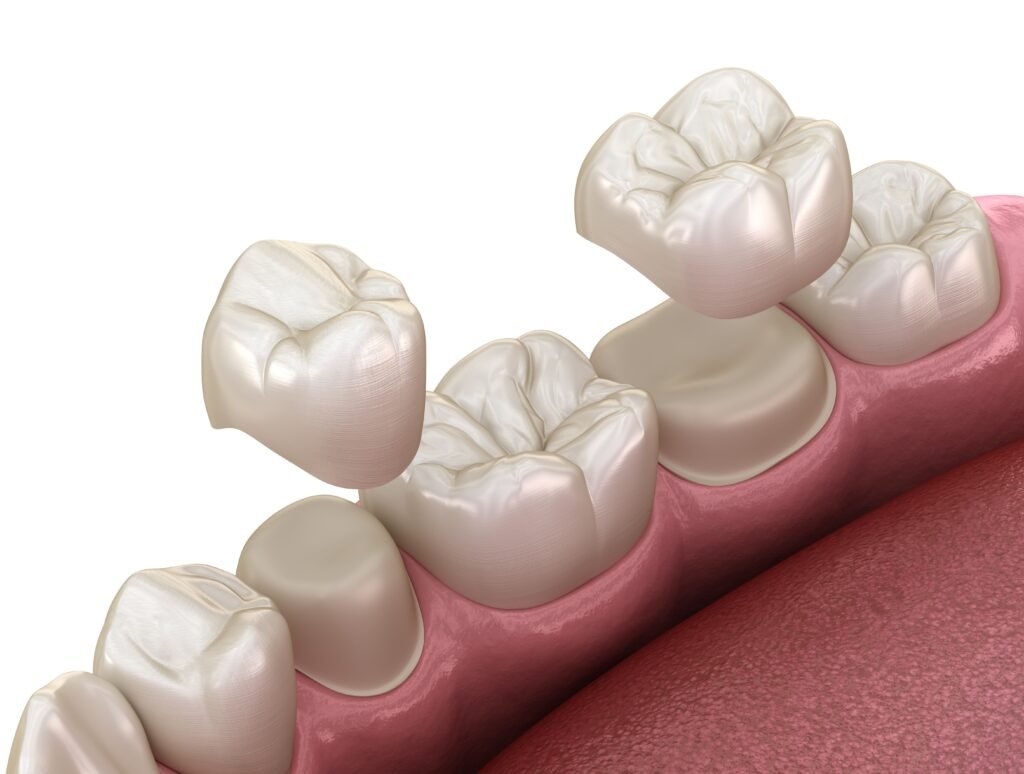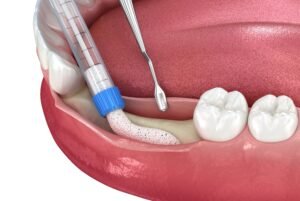Your smile is one of your most valuable assets. It’s a key part of how you express yourself and how you present yourself to the world. But what happens when a tooth is damaged, broken, or severely decayed? When a simple filling isn’t enough to restore its strength and appearance, a dental crown may be the solution you need.
At Little Smiles of Beverly Hills, we understand that getting a dental procedure can feel a little intimidating. That’s why we put together this comprehensive dental crowns guide. We want to demystify the process and give you all the information you need to feel confident and informed before your appointment. From understanding what a dental crown is to the step-by-step procedure and long-term care, we’re here to help you get your smile back on track with top-tier dental care.

What Exactly is a Dental Crown?
A custom-crafted dental crown, often called a “cap,” completely covers a damaged tooth. Unlike a filling that repairs only a small portion, a dental crown covers the entire visible part of the tooth above the gum line. Its primary purpose is to restore the tooth’s shape, size, strength, and appearance.
A dental crown is much more than a simple cover. It’s a sophisticated restoration with several crucial functions:
- Protection for a Weak Tooth: A crown holds together parts of a cracked or fractured tooth, preventing further damage.
- Restoration for Broken or Worn Teeth: A crown can restore a tooth that has worn down or broken from trauma or grinding. This is a common dental need.
- Support for a Dental Bridge: We use dental crowns on the teeth on either side of a gap to anchor a dental bridge.
- Reinforcement for a Large Filling: When a tooth has a very large filling and little natural tooth structure remains, a dental crown can provide the necessary support.
- Covering a Dental Implant: A dental crown is the final restoration we place on top of a dental implant to serve as a new, visible tooth.
- Improved Aesthetics: A dental crown can cover badly stained, misshapen, or mildly crooked teeth, significantly enhancing your smile’s appearance.
Choosing Your Dental Crown: Material Options
Choosing the right material is one of the most important decisions in the dental crown process. Your choice depends on the tooth’s location, your cosmetic goals, and your personal budget. Common dental crown materials include:
- All-Ceramic or Porcelain: These dental crowns offer a natural appearance. We can color-match them to your surrounding teeth, making them a great choice for front teeth. They are also an excellent option if you have metal allergies. While aesthetic, they may not be as strong as other materials.
- Zirconia: Known for its durability and strength, Zirconia is a popular new dental material. It’s a type of ceramic, but it’s much stronger than traditional porcelain. This makes it ideal for molars and back teeth that endure significant chewing pressure. It is also highly biocompatible, so your body tolerates it well.
- Porcelain-Fused-to-Metal (PFM): This type of dental crown provides a strong bond to the tooth and is more durable than all-porcelain crowns. However, the metal layer can sometimes show as a dark line at the gum line. This might not be ideal for a highly visible tooth.
- Emax: An all-ceramic dental crown made from lithium disilicate, Emax is known for its superior aesthetics and translucency. It looks incredibly natural. It’s strong enough for both front and back teeth and is a top choice for patients who want a durable yet beautiful restoration.
During your dental consultation, your dental professional will discuss the pros and cons of each material with you. This helps you make the best choice for your unique needs.
| Material | Best For | Pros | Cons |
| All-Ceramic / Porcelain | Front teeth | Natural appearance, good for allergies | Less durable for back teeth |
| Zirconia | Back teeth (molars) | High strength and durability, biocompatible | Less translucent than porcelain |
| Porcelain-Fused-to-Metal (PFM) | Front or back teeth | Durable, strong bond to tooth | Metal layer can show at gum line |
| Emax | Front and back teeth | Superior aesthetics, strong, natural look | Can be more costly than other options |
The Dental Crown Procedure: A Step-by-Step Guide
The process for a dental crown usually takes a couple of appointments. Some modern dental practices, however, offer same-day crowns using advanced technology like CAD/CAM systems. Here is a general overview of what you can expect from a top-tier dental procedure.
Step 1: Evaluation and Preparation
First, your dental professional performs a thorough exam. They use digital imaging and bite analysis to assess the tooth and determine if a dental crown is the right solution. They also check for decay, fractures, or other issues.
Next, your dental professional carefully numbs the area. They then prepare the tooth. This involves removing any decayed or damaged portions and shaping the remaining healthy tooth structure. The goal is to create a stable foundation for the new dental crown while preserving as much of your natural tooth as possible.
After preparation, we create an accurate model of the tooth. Many modern dental practices, including ours in Beverly Hills, use comfortable digital scanning tools. This digital model goes to a dental lab where they fabricate your custom dental crown.
To protect your prepared tooth, we place a temporary dental crown. This temporary restoration shields your tooth from sensitivity and allows you to function normally for a few weeks.
Step 2: The Fabrication Process
Skilled dental technicians use the digital impression to craft your custom dental crown. This process typically takes about two to three weeks. They meticulously create your dental crown to ensure a perfect fit, color, and shape.
Step 3: Permanent Placement
When you return for your second appointment, we remove the temporary dental crown.
Your new permanent dental crown is then carefully placed on the tooth. We check its fit, bite, and appearance to ensure it is perfect. We may make minor adjustments to ensure it blends seamlessly with your other teeth.
Once we are happy with the fit, we permanently cement the dental crown onto your tooth. This creates a strong, long-lasting bond.
Benefits and Longevity of Dental Crowns
A dental crown can significantly impact your dental health and quality of life. The benefits go far beyond just fixing a single tooth:
- Restored Function: Dental crowns restore your ability to bite and chew normally, relieving any pain or discomfort from a damaged tooth.
- Improved Aesthetics: A well-made dental crown can transform the appearance of a damaged or discolored tooth. It gives you a more uniform and beautiful smile.
- Long-Term Protection: By fully encasing the tooth, a dental crown provides durable protection against further decay or fracture. It preserves your tooth for many years to come.
- Relief from Pain: Dental crowns can help relieve unexplained pain caused by a hairline crack in a tooth. A hairline crack can make a tooth sensitive to hot and cold temperatures.
With proper care, a dental crown can last for a very long time. While the average lifespan is 10 to 15 years, many dental crowns last for 20, 30, or even more years. Zirconia dental crowns, in particular, are known for their exceptional longevity. The key to a long-lasting dental crown is excellent oral hygiene and regular dental visits. Our dental crowns guide is a great first step to understanding what’s involved.
Pros and Cons of Dental Crowns
| Pros | Cons |
| It restores the function and appearance of a damaged tooth. | The procedure requires removing some of the natural tooth structure. |
| It provides strong, long-term protection against further decay or fracture. | The cement can wash away, causing a dental crown to become loose or fall off. |
| It can correct cosmetic issues like discoloration or misshapen teeth. | A dental crown can sometimes cause temporary tooth sensitivity. |
| We can use it to restore teeth after a root canal or to support a dental bridge. | The cost of a dental crown can be higher than other restorations like fillings. |
| It is a highly durable dental solution that lasts for a decade or more with proper care. | A crowned tooth can still get decay at the base if you don’t clean it properly. |
How to Care for Your New Dental Crown
A dental crown doesn’t require any special or complicated care. You should treat it just like you would your natural teeth.
- Brush and Floss Regularly: Maintain your daily oral hygiene routine. Brush at least twice a day and floss daily. Pay special attention to the area where the dental crown meets the gum line to prevent plaque buildup.
- Regular Dental Check-ups: Continue to visit your dental professional for regular exams and cleanings. They can monitor the dental crown and the surrounding teeth to ensure everything remains healthy.
- Avoid Chewing Hard Objects: Dental crowns are very durable, but it’s best to avoid chewing on hard objects like ice, hard candy, or your fingernails. This can chip or break a dental crown.
- Consider a Night Guard: If you grind or clench your teeth at night, your dental professional may recommend a night guard. It protects your dental crown and your other teeth from damage.
Q&A About Dental Crowns
No, the dental procedure is not painful. Your dental professional uses a local anesthetic to numb the tooth and the surrounding gum tissue. You will not feel any discomfort during preparation and placement of the dental crown.
Yes, some modern dental practices use advanced technology like CAD/CAM systems and 3D scanners. They can design and fabricate a dental crown in a single visit. We call this a “same-day dental crown.”
The longevity of a dental crown varies depending on the material and your oral hygiene habits. With good dental care, dental crowns can last 10 to 15 years. In some cases, they last up to 30 years, especially with durable materials like Zirconia.
If your temporary dental crown falls off, call your dental professional’s office immediately. They will advise you on the next steps, which may include re-cementing the temporary dental crown to protect the prepared tooth.
Yes, a crowned tooth can still get a cavity. It happens at the junction where the dental crown meets the tooth. Maintaining good oral hygiene and flossing regularly is essential to prevent decay in this area.
No, you cannot whiten dental crowns with regular whitening products. If you plan on whitening your teeth, do so before you get a dental crown. That way, your dental professional can match the dental crown to your new, whiter tooth shade.
You may need a dental crown if you have a cracked, broken, or largely decayed tooth that a filling can’t support. Your dental professional determines if a dental crown is the best option after a thorough dental examination.
Yes, especially with modern materials like Emax and Zirconia. Your dental crown can be precisely color-matched to your surrounding teeth and crafted to have a natural shape and translucency. It can be almost indistinguishable from your other teeth.
Restore Your Smile in Beverly Hills
This comprehensive dental crowns guide shows that a dental crown is a powerful tool in modern dental care. Whether you are dealing with a damaged tooth, a large filling, or simply want to enhance your smile, a dental crown offers a durable and aesthetic solution.
At Little Smiles of Beverly Hills, we are committed to providing exceptional dental care to our community. We believe in educating our patients so they can make the best decisions for their oral health. Our experienced team uses advanced dental technology to ensure your procedure is as comfortable and efficient as possible.
To learn more about our comprehensive dental services and the full range of options available for your smile, please visit our Services page.
If you have more questions or are ready to schedule a consultation to discuss whether a dental crown is right for you, we invite you to contact us today.
We look forward to welcoming you and your family to our practice in Beverly Hills. To learn more about our team and philosophy, please visit our About Us page.



